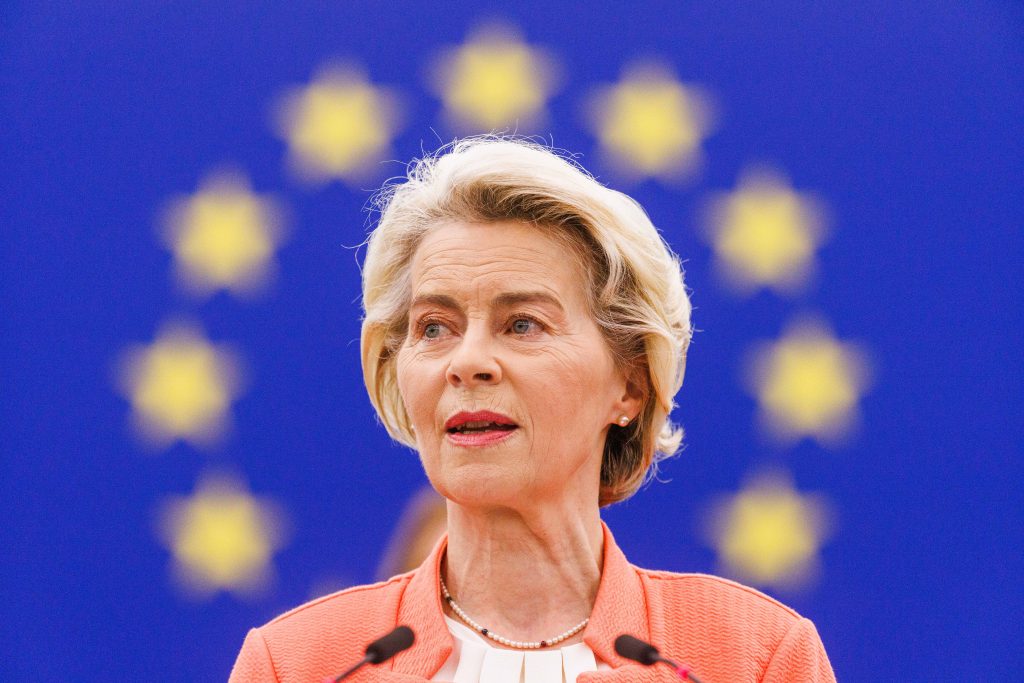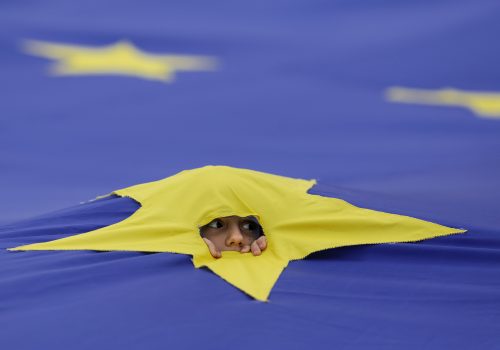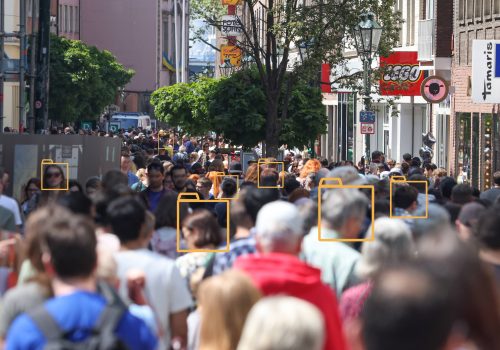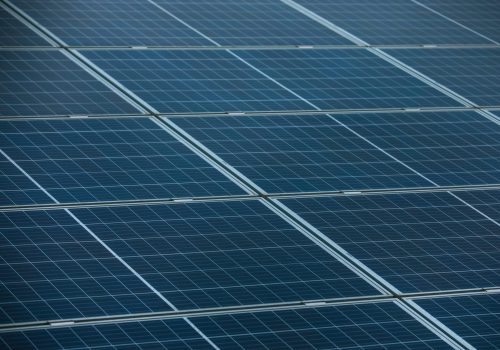Thirtysomething is the new twenty-seven. In her annual speech on the state of the European Union (EU) on Wednesday, European Commission President Ursula von der Leyen made the case for expanding the bloc beyond twenty-seven members.“ Team Europe,” she said, “works at thirty-plus.” The economy was also a big focus. Von der Leyen spoke about launching an investigation into unfair Chinese trade practices, regulating artificial intelligence (AI), and making it easier to do business in Europe. With EU elections less than three hundred days away, she urged the assembly to “finish the job” it had started and answer the “call of history.”
Below, Atlantic Council experts answer the call of six important questions on what the speech reveals about the EU’s future.
1. How is the EU’s approach to industrial policy and geopolitics changing (and in particular toward China)?
Von der Leyen’s state of the European Union speech confirmed the EU as a “geopolitical” union in which the impact of global politics resonates in almost every policy area. Von der Leyen’s EU aims to make itself resilient in the face of external challenges, to solidify its borders, and to ensure support for the economy. Although the phrase “strategic autonomy” was not used, it was a thread running throughout the speech. In response to recent criticisms that EU legislation has gone too far, she called for support for industry throughout the green transition—“the future of our clean tech industry has to be made in Europe”—and announced the launch of an anti-subsidy investigation into Chinese electric vehicles.
With the EU’s economic growth outlook recently revised downward (below 1 percent), she focused on competitiveness, announcing an initiative led by Mario Draghi, former prime minister of Italy, to do “whatever it takes” to make Europe globally competitive. Von der Leyen also looked to boost European startups by providing open access to Europe’s supercomputers for those developing AI, while touting the AI Act as a global standard—even before it is finalized.
—Frances G. Burwell is a distinguished fellow at the Atlantic Council’s Europe Center and a senior director at McLarty Associates.
2. Is the EU reopening to enlargement? And how has the war in Ukraine shaped this issue?
New momentum behind enlargement has been building ever since the start of Russia’s war in Ukraine. The war put geopolitics back into the enlargement process. It has convinced even traditional critics, such as France, that Europe won’t be able to eliminate dangerous gray zones in its neighborhood and re-establish long-term security and stability without bringing in Ukraine, the Western Balkans, and potentially others.
Similar to the big-bang accession round of 2004, enlargement today is increasingly seen as a geopolitical tool and a process that’s political, not merely technical. In von der Leyen’s words, most in Europe realize that with the war dragging on, the EU has little option but to “answer the call of history.” That means admitting those members of the European family that are still outside the European project, not least Ukraine. But her speech also set out some important principles—ambitious reform will be necessary from both within the EU and among the candidates. And the process will remain merit-based. Watch this space for how the twenty-seven member states are already positioning themselves on both EU reform and accession.
—Jörn Fleck is the senior director of the Europe Center.
While von der Leyen embraced “strategic autonomy,” she is not pulling the drawbridge up across the moat. She also called for Ukraine, the Balkans, and Moldova to become EU members, something that even a year ago would have been far too courageous for any politician thinking of running for office again.
—Frances G. Burwell
“The future of Ukraine is in our Union. The future of the Western Balkans is in our Union. The future of Moldova is in our Union,” emphasized von der Leyen in her annual State of the Union address this year. In many ways, this echoes her address in 2022, but there are notable distinctions between the two.
First, the concept of the European Political Community, which was introduced as a potential alternative to full membership and grandiosely announced in 2022, was conspicuously absent from her speech this year. Instead, she presented a vision of a “Union encompassing over five hundred million inhabitants, characterized by freedom, democracy, and prosperity.”
However, in what appears to be an effort to encourage the enthusiasm of aspiring member states, von der Leyen went on to specify that this promise pertains exclusively to “vibrant democracies where the judiciary operates independently, opposition voices are respected, and journalists are safeguarded.” For candidate countries in the Western Balkans, this condition serves as a stark reminder of the rigorous reforms they must undertake as an essential prerequisite for joining the European family. It remains to be seen whether this unambiguous clarification will silence numerous voices from the Balkans requesting a definitive date for full membership.
—Maja Piscevic is a nonresident senior fellow with the Atlantic Council’s Europe Center and representative of the Center in the Western Balkans.
In her State of the Union speech, von der Leyen delivered a key message to Western Balkan countries and their leaders: EU enlargement depends on their commitment to deep reforms, improved rule of law, and economic prospects.
The president of the European Commission’s announcement of “Rule of Law Reports” for countries in the accession process demonstrates the EU’s rigorous and merit-based approach to enlargement. Notably, she avoided specifying a date for the next European Day of Welcomes and economic success stories. This omission may be to manage expectations in the region after European Council President Charles Michel’s mention of 2030 as a potential accession timeline for candidate countries. Von der Leyen emphasized that economic success is integral to EU membership, in an attempt to debunk the notion that it’s a mere political formality. However, it is essential to remember that the decision to admit new members rests with all twenty-seven EU member nations, requiring unanimous agreement for any expansion.
Von der Leyen highlighted Ukraine’s progress toward accession as a success story, which demonstrates the impact of the war on EU enlargement. Russia’s invasion of Ukraine, among other factors, is potentially paving the way for quicker advancements for Ukraine and Moldova. Nevertheless, creating a faster accession tier for Ukraine and Moldova may anger leaders in the Western Balkans, especially regarding the rule of law and anti-corruption criteria for membership, especially since von der Leyen’s speech emphasized that the accession process is intended to be merit-based.
Von der Leyen’s vision for the next enlargement as a “catalyst for progress” acknowledges challenges in adapting policies to an expanded EU. Her statement that enlargement doesn’t require a new convention or treaty change suggests a pragmatic, efficient, and welcomed approach.
The message to Western Balkan leaders is clear: EU membership demands hard work and adherence to shared values and rules. The accession process is a two-way street, requiring domestic reforms to meet EU standards.
Finally, von der Leyen’s speech is crucial for affirming the EU’s commitment to enlargement, emphasizing economic progress, adaptive policies, and shared values. The onus is on Western Balkan countries to earnestly pursue their European future, through hard work and life-changing reforms.
—Ilva Tare is a nonresident senior fellow at the Europe Center and was most recently a broadcaster with EuroNews Group.
3. What are the EU’s plans for digital policy and digital sovereignty?
On digital policy, von der Leyen’s speech was part victory lap, part promise of more of the same. She touted the accomplishments of the EU’s flagship Digital Markets Act and Digital Services Act as “historic” in setting global standards. Building off of that, she pledged much of the same in making the pending AI Act “a blueprint for the whole world.”
Whether the EU can continue to shape emerging technology fields through the so-called Brussels effect and by leveraging the regulatory power of its single market alone remains to be seen. Critics of the EU’s digital regulatory agenda might read much into the fact that the digital chapter of her speech was separate from the competitiveness section. But Europe’s current positioning in the global tech race, especially on AI, will require more of the next commission than a fleeting reference to innovation and competitiveness when it comes to the EU’s digital agenda.
—Jörn Fleck
4. What was revealed about the EU’s energy transition?
Declaring that Europe has “shifted the climate agenda to being an economic one,” von der Leyen’s speech highlighted the energy transition’s implications for employment and competitiveness amid a tectonic change in Europe’s energy relationships. It sought to thread the needle between onshoring clean energy supply chains and working with international partners to make the transition happen.
After lauding Europe’s success in persisting through winter while leveraging the energy crisis to “fast-track the clean transition,” the speech stressed the need to work with industry to ensure that transition is “made in Europe.”
Acknowledging Europe’s slowing pace of wind power deployment, the president announced a European Wind Power package and pledged to address bottlenecks in permitting, labor, and materials. Doubling down on Europe’s Inflation Reduction Act-inspired Net-Zero Industry Act, von der Leyen vowed that Brussels “will keep supporting European industry throughout this transition.”
The speech underlined Europe’s de-risking approach to China in cleantech, making an explicit parallel to the European solar industry’s demise at the hands of Chinese subsidies in announcing an anti-subsidy investigation into Chinese electric vehicle imports.
Von der Leyen conceded that on critical raw materials, developing world exporters have a valid interest in seeking to move up the value chain from extraction of materials to refining, processing, and cleantech manufacturing.
However, in calling for trade deals with such countries, including Indonesia—which Brussels took before the World Trade Organization over its ban on nickel exports to grow its processing industry—the speech sidestepped the difficulties in achieving a consensus with mineral exporters. Indeed, the right balance between European onshoring and open trade remains elusive.
—Paddy Ryan is the assistant director for European energy security at the Atlantic Council Global Energy Center.
5. How is Europe’s approach to the Global South changing?
Under the combined pressures of Russia’s war in Ukraine, the subsequent energy crisis, and China’s new assertiveness, von der Leyen’s “geopolitical commission” has been upgrading its approach to Africa, Latin America, and parts of Asia. This involves combining tools from across the EU’s trade policy, development assistance, infrastructure investment, tech policy, and more. Europe’s Global Gateway investment program and the recent India-Middle East-Europe Economic Corridor are more than counterproposals to China’s Belt and Road Initiative. They are also an inevitable part of the EU’s de-risking strategy and necessary to underpin Europe’s green and digital transitions.
—Jörn Fleck
6. Von der Leyen’s term will end in 2024. Might she stand for office again?
It is hard to read von der Leyen’s speech as anything but another building block in her campaign to stand again. It combined a powerful recital of Europe’s accomplishments and those of her own agenda with a carefully calibrated package of signals and offers to existing supporters and potential political allies. The shout-out to farmers and her calls to ease doing business in Europe will have gone down well among the Christian Democratic party family. Powerful references to her green agenda and the devastating impacts of climate change across Europe could woo the Greens group, which may become kingmakers in the next European Parliament. And her strong stance on Ukraine and enlargement could help shore up Central European support outside of Poland and Hungary, where she might lose future support thanks to the commission’s rule-of-law sanctions against both.
—Jörn Fleck
Further reading
Fri, Jun 30, 2023
The next European Union member is…
New Atlanticist By
Ten years after Croatia joined the bloc—the last country to do so—Atlantic Council experts look at eleven countries that might join next.
Thu, Jun 15, 2023
The world’s regulatory superpower is taking on a regulatory nightmare: artificial intelligence
New Atlanticist By
Atlantic Council experts answer the most pressing questions on the EU's AI Act, including what's in it, when it could become law, and what it means for the world.
Wed, Sep 6, 2023
Policy memo: A NATO-style spending target could fund long-term decarbonization
In-Depth Research & Reports By Ben Judah, Francis Shin, Rachel Rizzo, Théophile Pouget-Abadie
EU member states and like-minded allies should set national-level spending targets, each based on a percentage of their respective annual GDPs, for decarbonization-related purposes. This would provide the basis of an international coalition that would ramp up global climate spending and set a useful benchmark to anchor high-level diplomatic discussions on the subject.
Image: Ursula von der Leyen, President of the European Commission, stands in the European Parliament building and speaks.



